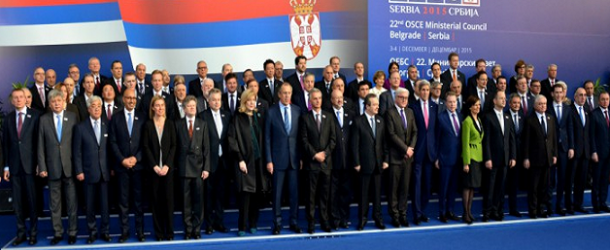For many years, almost since the very day of occupation of Azerbaijan’s territory, the leading world powers on different international levels have expressed their concern about the fact that the Nagorno Karabakh conflict remains unresolved. Such a rhetoric is more of an outcome of efforts of Azerbaijan’s diplomacy and performance of its government in the system of international relations rather than the eagerness of the great powers to resolve this protracted conflict. And if until now those countries were making only declarative statements regarding the need to solve this conflict, without even once putting pressure on the aggressor country, recently, they started to express their readiness to contribute to peace in Nagorno Karabakh more frequently.
Co-chairs Started Talking About Peace in Karabakh…
By the way, similar unanimity was noted in the joint declaration by the heads of delegation of Russia, France and the United States at the recent 22nd OSCE Ministerial Council held in Belgrade under Serbia’s Chairmanship. Frankly speaking, expectations towards this meeting were raised unrealistically because it was no different than the previous one held exactly a year ago in Switzerland. This time around, it was held against the backdrop of active phase of conflict in Syria, flow of migrants from the Middle East to Europe, exacerbation of relations between Moscow and Ankara, deepening of the Ukrainian crisis and increased tension along the Armenia-Azerbaijan line of contact.
There were objective and subjective reasons as to why the outcome of the summit failed to meet expectations of the Russian and Turkish sides that were looking to forge a friendly dialogue. The same applies to the issues directly linked with Russia-Ukraine ties and Russia’s relations with the West. But this is another subject. The point is that mediators in the resolution of the Nagorno Karabakh have drawn the international community’s attention to the fact that the conflict constitutes a major threat to peace and security in the region.
Usual Provocations Ahead of the Summit
Keep in mind that deterioration at the line of contact from the Armenian side started prior to the summit and tensions escalated as the meeting went on. This is quite natural because Armenia resorted to such provocations repeatedly in the past, particularly ahead of important negotiations or events of international significance. In reality, Armenian provocations have two target audiences – domestic and international.
On one hand, the country’s leadership aims to distract the public from socioeconomic crisis that is worsening day by day and provokes resentment of the masses. Therefore, the authorities are trying to prove its credibility when it comes to occupation of Azerbaijan’s territory. On the other hand, it blatantly attempts to consolidate the existing and inadmissible state of status-quo for indefinite time by accusing Azerbaijan of ceasefire violations. To that end, the ruling regime spares no effort to resettle the Armenian refugees from Syria in the occupied territories of Azerbaijan and even implement some infrastructural changes there.
Permanent ‘Victim’ Image
Presence of the armed forces of Armenia in the occupied territories is the main obstacle in the resolution of the conflict and since the world powers are doing nothing to prevent that, the separatists continue to enjoy greater leeway. It is not surprising that owing to its provocations along the line of contact and the border between the two countries, Armenia has suffered greater losses during the exchange of fire involving large-caliber weapons, mortars and other types of heavy weaponry, compared to Azerbaijan that has an edge over its neighbor in terms of military capabilities. Authorities in Yerevan perfectly acknowledged that and therefore, they demonize Azerbaijan as an aggressor state every time they play a ‘victim’.
Yerevan’s trump cards?
Meanwhile, populist declarations coming from the authorities in Yerevan baffle every reasonable politician. What aggression are we talking about when a nation aims to defend its territory from subversions and military assaults by the enemy? Apparently, the Armenian government has developed the pathetic ‘Plan X’ that targets not the sophisticated, by all accounts, international community but the bunch of dimwitted politicians. Yet the main point is whether the international community, represented by the likes of the U.S., Britain, France and others, is willing to demonstrate the healthy interest on the issue of Armenian-Azerbaijani standoff, as it was the case with Russia-Ukraine conflict or annexation of Crimea?
Regrettably, there are no changes in the positions of the leading nations of the world and that gives Yerevan additional trump cards for pursuing the aggressive policy against the official Baku. That is why unless the great powers reconsider their vision of the resolution of this conflict and put pressure on Armenia as an occupying state, none of the international efforts would be productive. In this sense, the recent summit would be remembered as yet another platform where Armenia had tried to put up a brave front.
More Than Allies
A bad peace is certainly better than a good quarrel. That is what diplomacy is for, which presumes reaching a consensus, but only when desire to do so is mutual. Whereas we have to deal with an adversary that wishes to speak solely the language of force and confrontation. Armenia is not prepared for peaceful dialogue and therefore rejects such format of interaction. It is no secret as to what and most importantly, whom Armenia relies on when this small, impoverished and languishing country behaves so frivolously. Armenia’s patrons do not abandon strategic partnership with Azerbaijan and even support territorial integrity of our country, albeit through declarative statements. These circumstances relegate the debate about the efficiency or conversely, inaction of the OSCE format, regardless of certain efforts made by the co-chairs.



















































